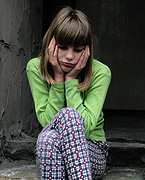
MONDAY, Oct. 22 (HealthDay News) — Children who are picked on by their peers or are abused or mistreated in other areas of their lives are more likely to think about killing themselves, a new study reveals. And the more areas of their lives in which they are victimized, the higher their risk.
The new findings, which appear online Oct. 22 in the journal Archives of Pediatrics & Adolescent Medicine, provide a disturbing snapshot of the consequences of bullying and other forms of youth victimization.
In the study of nearly 1,200 children and adolescents (aged 10 to 17), 4.3 percent said they had experienced suicidal thoughts — known as suicidal ideation — within the month before they were interviewed by researchers. When compared to participants who were not victimized at all, those who were bullied by peers were more than twice as likely to think about killing themselves in the past year.
Youth who were sexually assaulted had 3.4 times the risk of thinking about suicide and those who were maltreated had 4.4 times the risk of suicidal ideation during the past year.
At greatest risk were kids who were exposed to seven or more individual types of victimization in the past year, the study showed. These kids were almost six times more likely to report suicidal thoughts.
“Exposure to multiple forms of victimization is especially detrimental,” said study author Dr. Heather Turner, professor of sociology at the University of New Hampshire, in Durham. “These kids may be exposed to crime and violence at home by witnessing their parents fighting and other types of domestic violence, and they may witness violence in their neighborhoods and be bullied on the Internet. These are kids that are clearly experiencing a huge amount of adversity in multiple areas of their lives.”
To catch at-risk kids, she said, “we need more of a holistic youth-centered approach.”
One expert said the new research confirms what has been known and suspected about the consequences of youth victimization.
“There is a real risk of suicidal ideation among kids who are victimized in multiple areas of their lives,” said Dr. Joseph Wright, a pediatrician at Children’s National Medical Center in Washington, D.C.
Recent news stories have focused on high-profile bullying incidents with fatal consequences. But there’s a bigger picture as well.
“Suicide is the tip of the iceberg, and this data shows us what is below the surface and that is very frightening,” Wright said.
Suicide is the third leading cause of death for adolescents in the United States, according to background information included in the study.
It’s not always easy to tell which kids are thinking about suicide, said Dr. Victor Fornari, director of the division of child/adolescent psychiatry at North Shore-LIJ Health System in New Hyde Park, N.Y.
“Many youth who have suicidal thoughts do not appear sullen and, when asked, will deny it,” he said. “When a child mentions killing themselves, we have to take it seriously. We don’t know when they are serious or not unless it is evaluated.”
Getting help for these kids is crucial, experts agree.
If you think a child is being victimized or thinking of hurting themselves, tell someone who is in a position of authority immediately. Do not wait. If you are having thoughts of hurting or killing yourself, tell someone you trust: a parent, friend, school guidance counselor or health care provider.
The National Suicide Prevention Lifeline is available around the clock at 800-273-TALK (800-273-8255).
More information
For more about suicide prevention, visit the U.S. National Institute of Mental Health.

